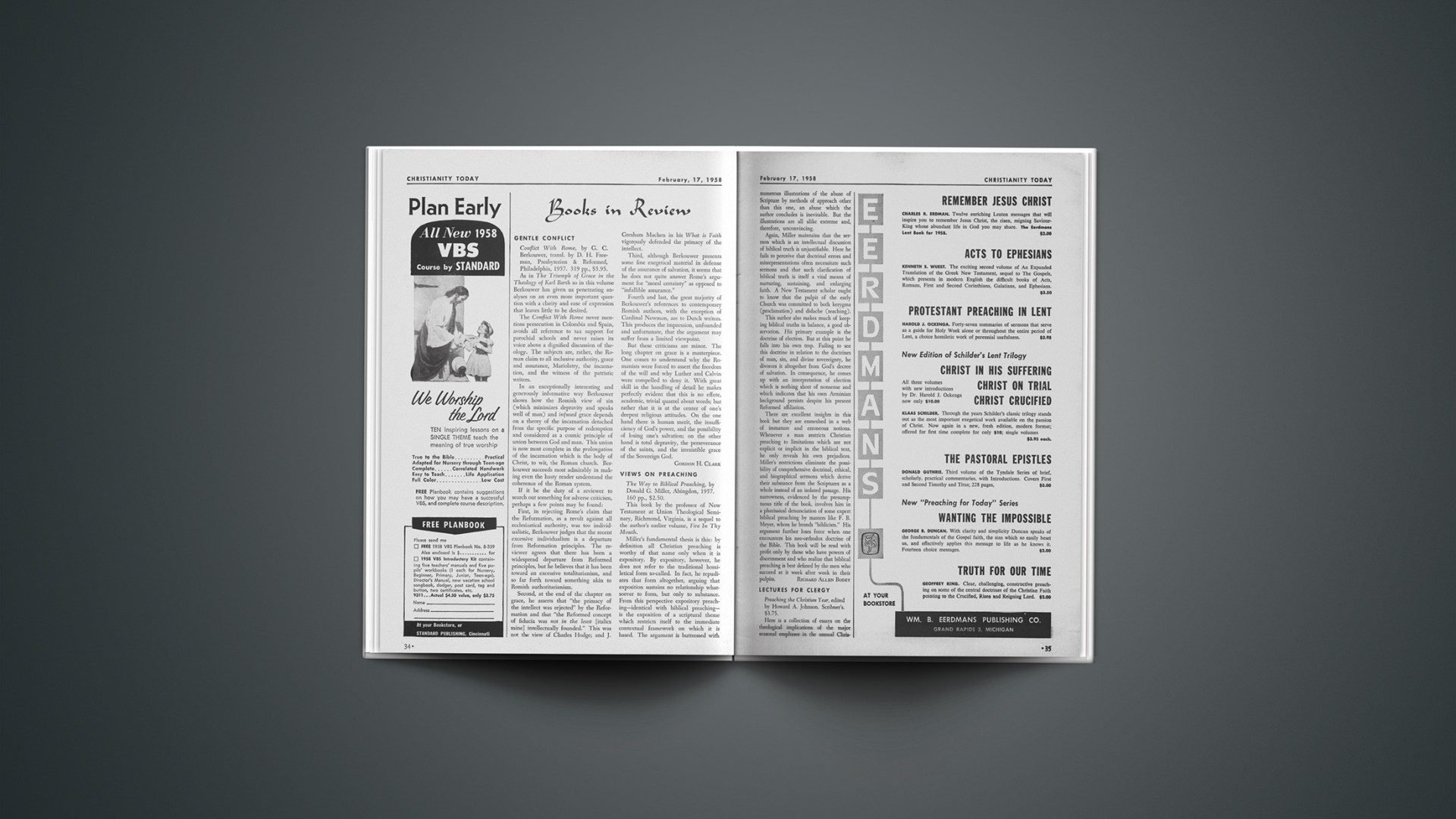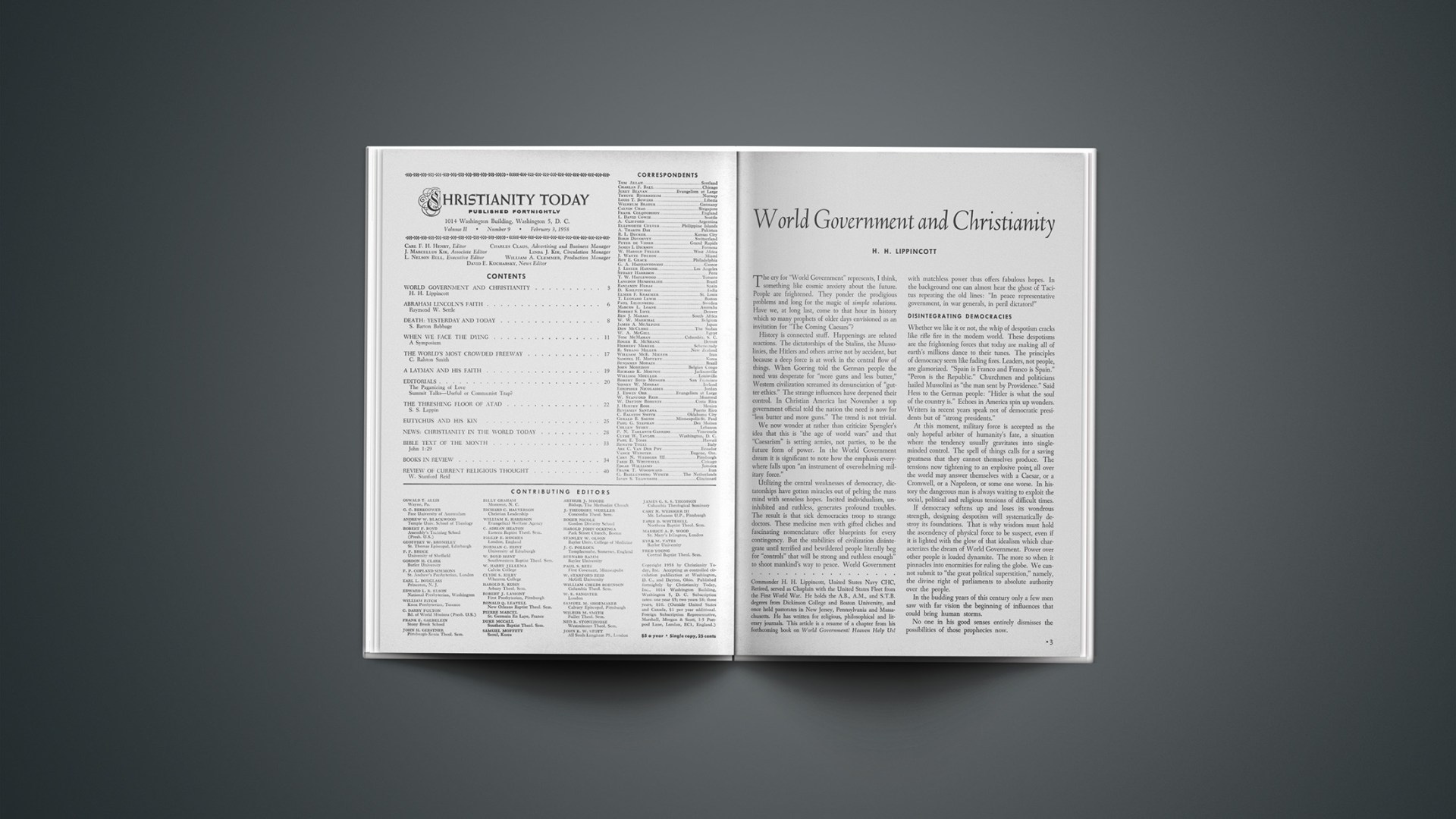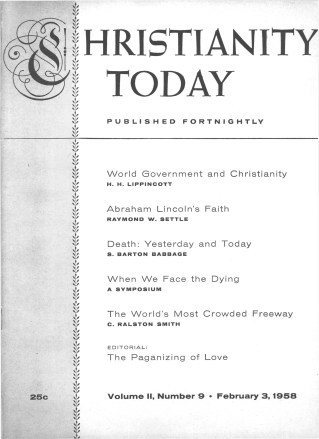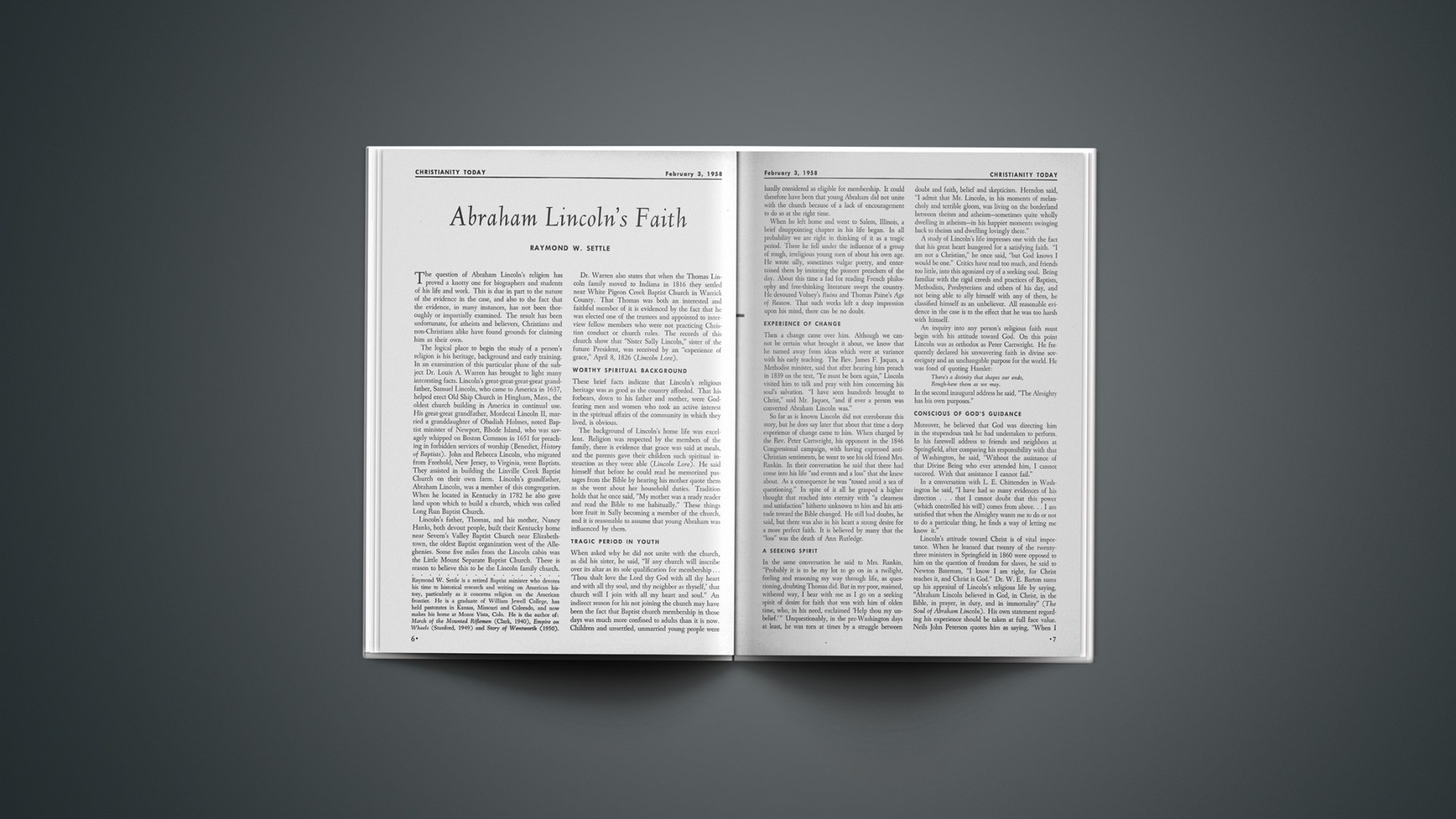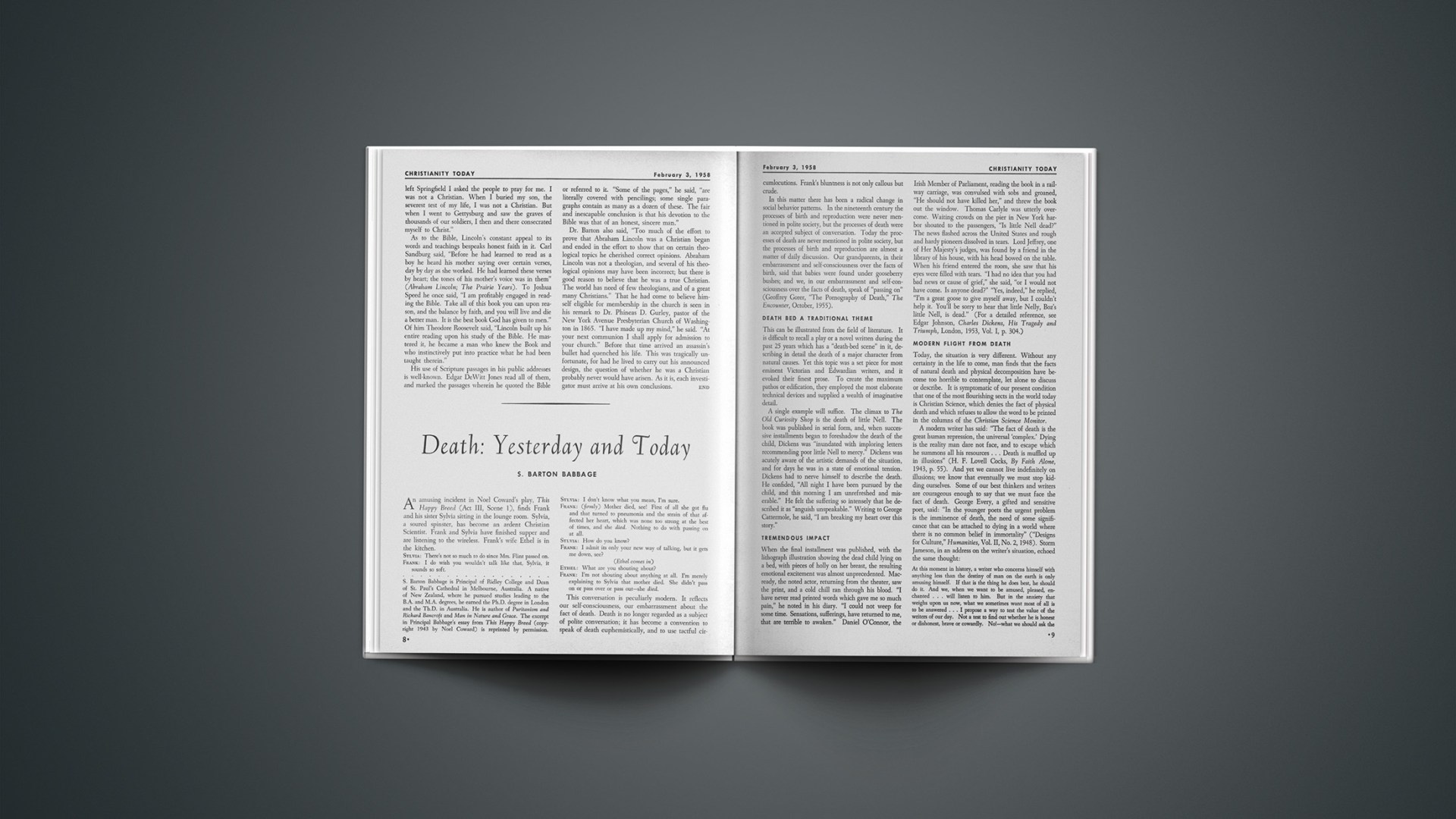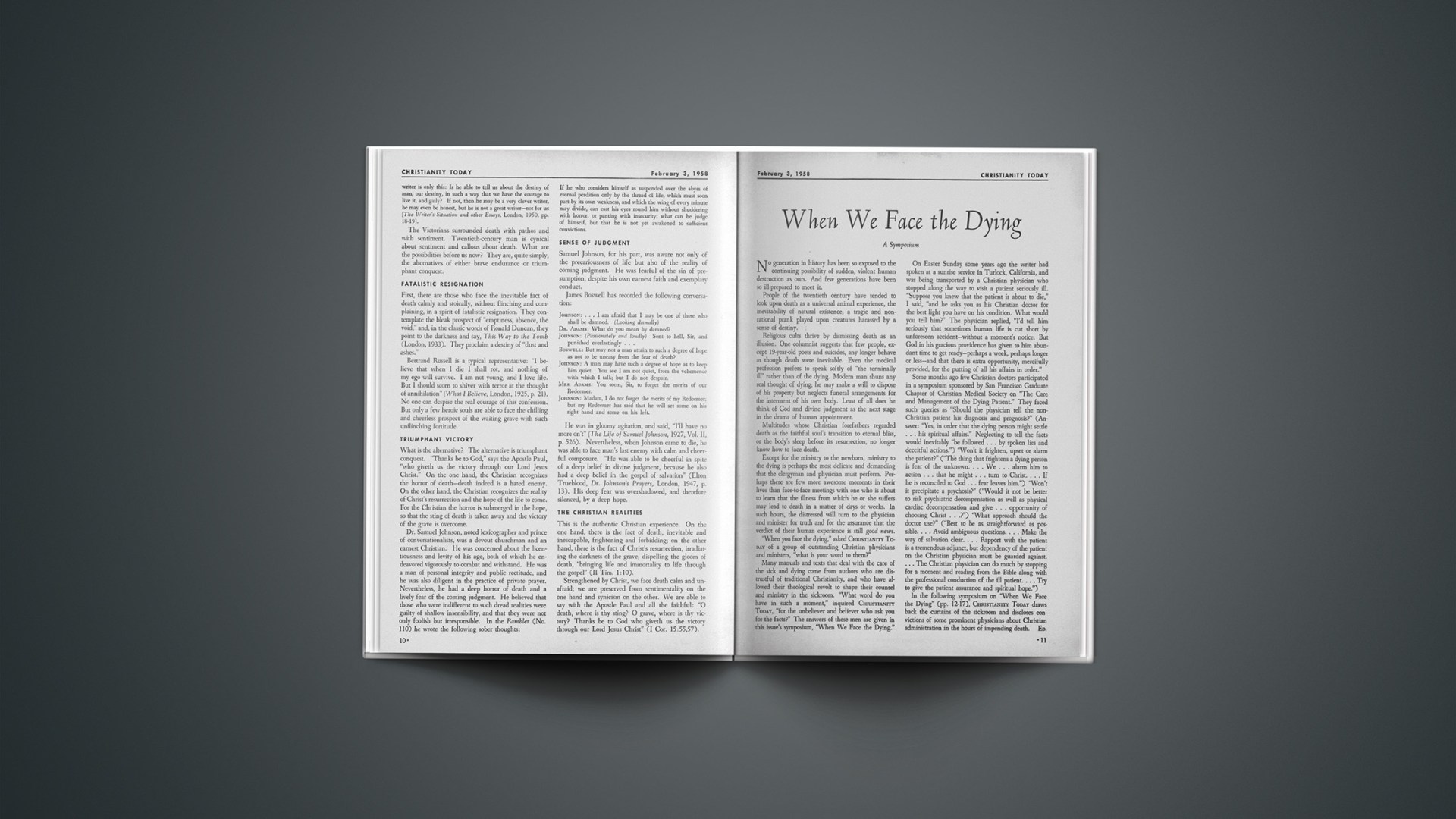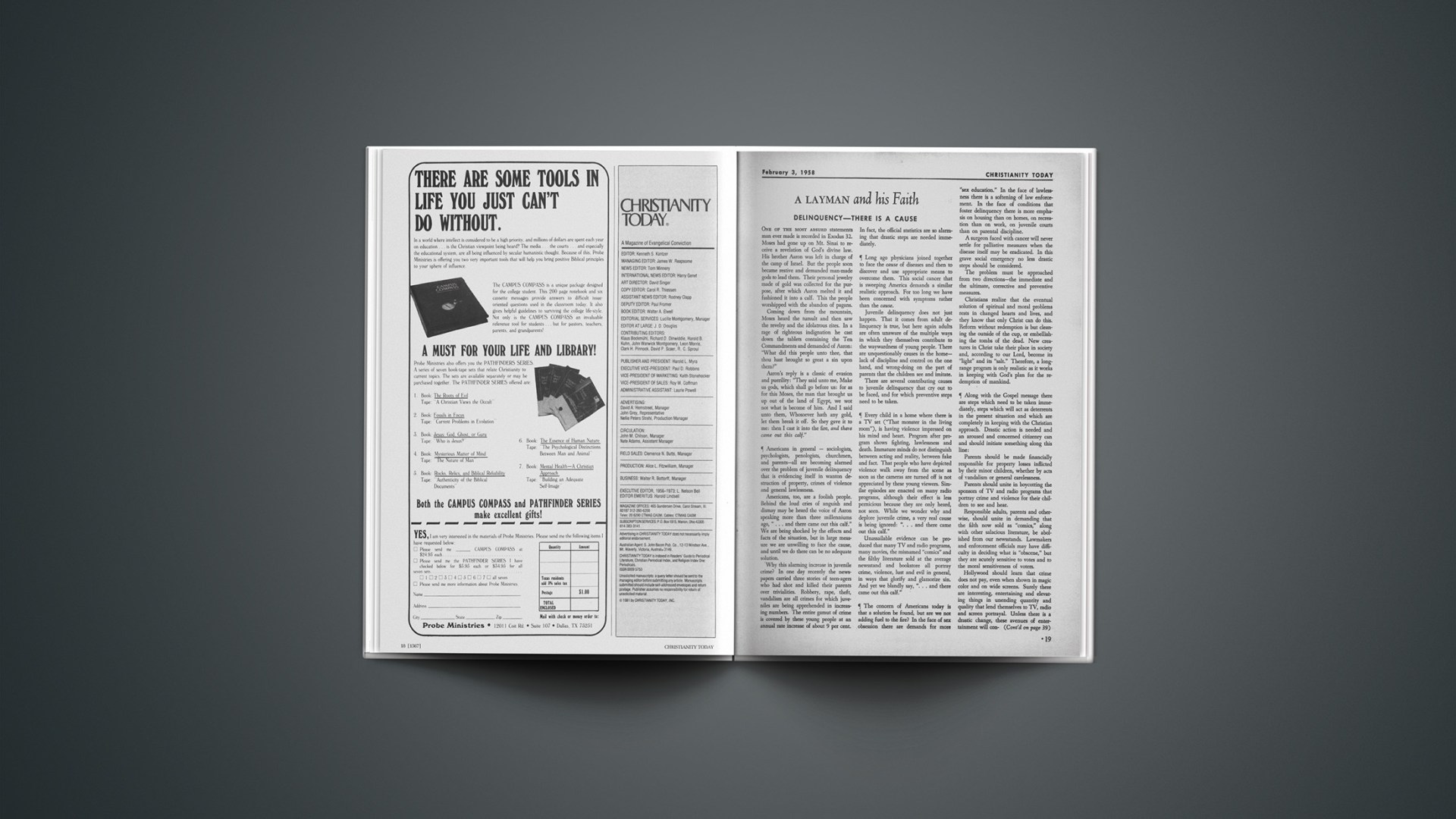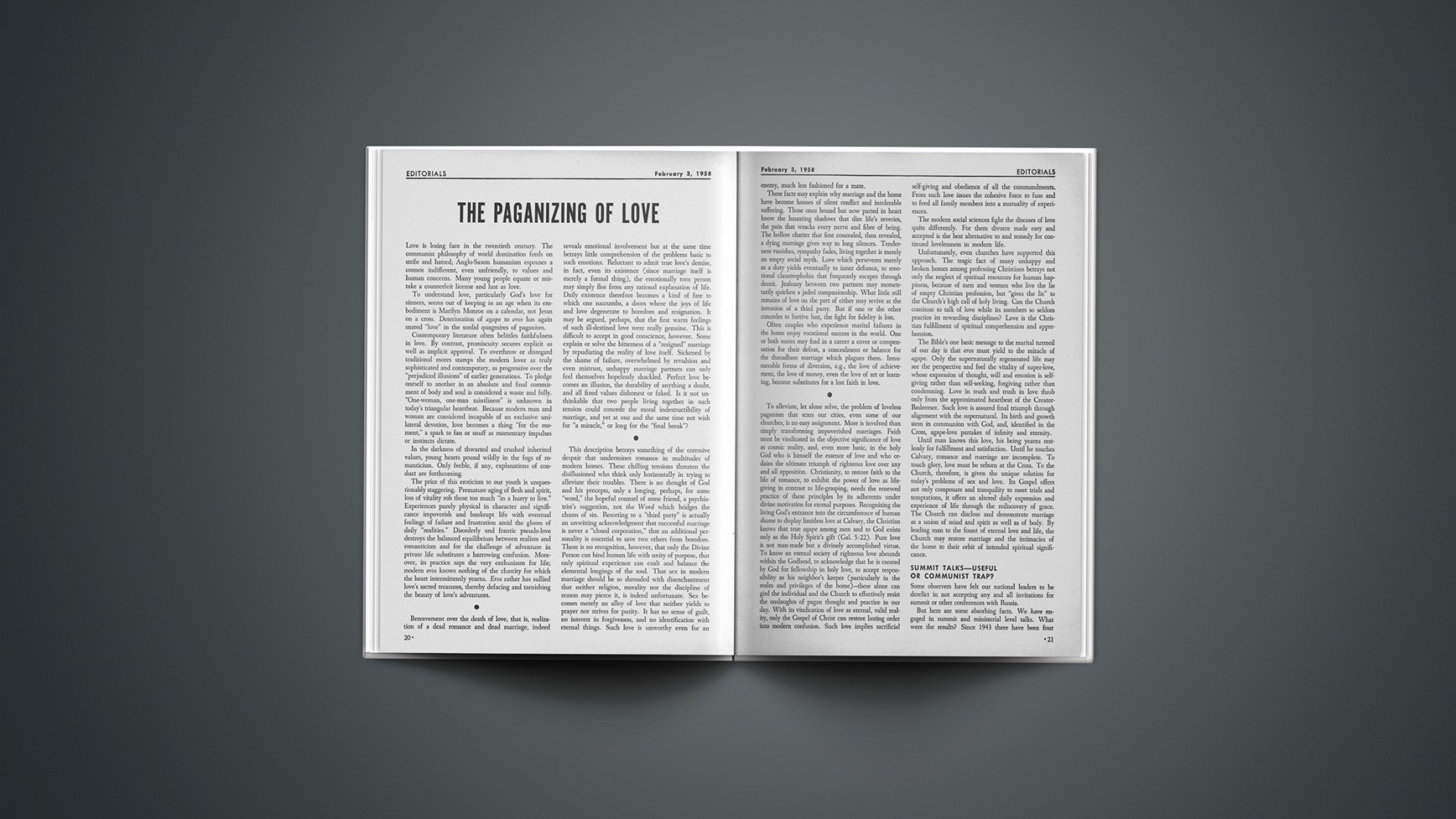“Religion Faces the Atomic Age.” This was the title of a conference called Feb. 2 and 3 by the University of Chicago through its Federated Theological Faculty to “consider comprehensively how the spiritual resources of this country must be mobilized to save us.” It was further stated that though we must meet the Soviet scientific challenge, science “can only offer us a protracted and exhausting armament race. Victory and survival will only come through a deeper understanding of the laws that govern the hearts and minds of men and the practical application of these laws in our national life and our international relations.”
Facing The Right Fears
For this purpose an outstanding array of speakers was gathered from the fields of religion, education, and business. The initial topic considered was “Facing the Fears of the Atomic Age.” Dean of the Federated Theological Faculty, Jerald C. Brauer, explained that it was felt best to build what should follow in the conference upon the “personality sciences.”
Delegates were told bluntly that one of America’s greatest failings today is that she lacks a proper fear of the right things. Dr. Gardiner Murphy, Director of Research of the Menninger Foundation, stated that the first psychological problem is “why apathy, hopelessness, irresponsibility, evasion, business-as-usual, or the most pathetic and trivial toying with momentary escapes or palliatives, should dominate the thought of the Western world.” He defended certain “rational fears” in an “age of potential devastation,” such as fears of smugness, hypocrisy, self-deception, and aimlessness.
Dr. Seward Hiltner, Professor of Pastoral Theology of the Federated Theological Faculty, pronounced our situation “unprecedentedly fearsome” and indicated paralysis in the face of enormity as one reason for our not facing up to the basic fear. “We are like Mickey Mouse—who finds some magic coming to his aid in disposing of the giant.” But if we continue this, “our civilization will perish—not as a society of brave men who tried their best and lost, but as mice, as Mickey Mice whose magic powers failed to appear on schedule.”
The Conflict Of Faiths
The conference next addressed itself to the problem of Communism—“Two Faiths in Conflict.” Dr. Alexander Miller, Associate Professor of Religion at Stanford University, warned against “the oratorical commonplace that the issue hinges on Communist atheism and materialism.… The trouble with Communism is not so much that it is godless, but that it … exalts a false god into the place of God.… Marxism is one modern form of the ancient natural religion … in which the natural powers and dynamisms on which man’s life depends are deified.…” Prof. Miller also cautioned against the “deadly danger” of identifying our enemy with antichrist, “partly because no human being and no human movement achieves such majesty of evil, and partly because it implies too much virtue in ourselves.”
Also speaking on the Christianity-Communism conflict was John Nuveen, president of a Chicago investment firm and former administrator of economic aid in Greece. The uncommitted nations will ultimately “tip the scales one way or the other” in the present world struggle, he said, by way of calling for an increase in economic aid to these countries. But at the same time he warned that foreign aid to a country is “interpreted as an endorsement of the government in power and helps to keep it in power. If it is a good government and bent upon the establishment of the free institutions which have been inspired by Christian principles, then our aid serves the cause of Christianity,” but if otherwise, we are building up explosive pressures that can be utilized by the Communists.
After a session on public education, Dean Brauer spoke of problems in educating ministers for the atomic age, noting that in this time of great need many men are leaving the ministry. He pleaded for a rigorous search “in the past and present resources of Christian faith for new goals, methods, and directions.”
Religion And Materialism
Next considered was religion’s role in the world of business. Edward C. Logelin, vice-president of United States Steel Corporation, spoke of ways in which religion can help the businessman, while Sears Roebuck Vice-President James C. Worthy pointed out dangers inherent in the secularization of business morality. Blame for this, said Worthy, former Assistant Secretary of Commerce, is to be laid more at the feet of the preachers and theologians “who have failed to make explicit the relevance of religious faith to business practice.” One result is the concept of self-interest as the generally accepted theory of business motivation. “Communists and socialists play up the symbols of human welfare but neglect, and often violate, the reality! The American business system emphasizes the symbols of self-interest, but actually operates with substantial concern for human values.”
Rescuing Religious Values
The final session, at the Palmer House, addressed itself to the general theme of the conference, religion in the atomic age. Dean Brauer denounced the misuse of religion simply to guarantee our safety. Rather it should provide motivation for seeking out God’s will in this world. Lawrence A. Kimpton, Chancellor of the University of Chicago, confessed that “we are sore afraid, and we know not where to turn.… The purpose of the conference we are concluding this evening is to suggest that we turn to the great resources of our religion.”
Distinguished chemistry professor Harold C. Urey noted that the battle between science and religion saw the former the complete victor. This revolution of the past century is permanent, he averred, and past customs and beliefs will not return. Through science man today “possesses the most magnificent view of a marvelous universe that he has ever had. Religions have attempted to do this in the past and their success has been anything but equal to that of modern science in this field.” However, Prof. Urey confessed that science tends to lead to a purely materialistic view of life, offering little to support a belief in the dignity of man; in this field religion has always made its great contribution. Today religion is challenged to maintain the old values, i.e. “give us a sound moral life and noble aspirations.”
Giving the concluding address in stirring fashion was Charles P. Taft, Cincinnati mayor and former president of the National Council of Churches. Concerning the cold war, he urged the clergy “to utilize all the psychological insight expressed in our ideal of the democratic process to proceed in ways that may get our opponents to move.” Secondly, he continued, the same means are to be used to persuade our own people to move. Giving mankind a consciousness and belief in values will be a long struggle and we must exercise much patience. The problem, he concluded, is the application of religion in an evil world, and ministers must help through continued counsel and guidance in preaching and teaching.
Christian Ambiguity
The Federated Theological Faculty is to be commended for recognizing the danger of the hour and for seeking solution in the area of spiritual principles. Yet it would be a bold spirit who would claim that the solution or solutions had been found through this “comprehensive” consideration of “how the spiritual resources of this country must be mobilized to save us.” Indeed, it seemed that the spirit of tentativeness stalked the conference. Chancellor Kimpton declared, “We have not sought the moral and spiritual answers nor do we have them in our time of great need.” Dr. Murphy counseled an active program against the threats of today but did not suggest its content, leaving his listeners with hope in a slowly maturing psychology. But would it be too slow for this age? Courage to face the danger was Dr. Hiltner’s counsel, but others were left the task of charting a pathway of action. In the final session Prof. Urey simply presented the problem religion faces, as he sees it, and wished the delegates success in their search for a solution. Mr. Taft, who conceived the convention as being more in the nature of a tribute to the Federated Theological Faculty, counseled psychological insight and patience.
If one looked for a serving of theological issues in this conference on religion, barrenness was his main fare. Dr. Murphy seemed to be chiding Protestant liberalism when he referred to “Main Street Christianity being responsible for having blunted and shallowed the normal capacity for fear as well as righteous indignation against injustice.” He also set himself against those liberals and humanitarians who say that the control of the atom is the only problem, forgetting the more basic problem of human nature. But then we find him employing an easy grouping of Gautama, Socrates, and Jesus, all of whom in their supreme moments grasped a point of wisdom for which Dr. Murphy was contending. Dogma, he said, in answer to a question, can be useful in disarming fears and is workable in some periods for some people, but tends to become the more precarious the longer it is held. In a similar vein Prof. Urey called for a religion unencumbered with “illogical dogmas.”
Dr. Hiltner called for an inquiry into our faith, while Dean Brauer asked for a search into the Christian faith, past and present, for new goals. It is possible, he contended, for a concentration on the present to rob the student of his rich heritage and even “the very ground of faith itself.” What this ground is or what elements Dr. Brauer would take from the history of the faith, he did not say. Likewise, Mr. Taft, in calling for theology and not just ethics, offered no elaboration as to the kind of theology needed.
The old liberal optimism was, of course, by the nature of the occasion somewhat subdued. There was some disagreement as to whether this is actually the most dangerous period of our history. What pacifist element there was present seemed confined to the delegates. None of the speakers questioned appeared ready to propose massive resistance through nonviolent means, but rather seemed relieved that we still were able to manage a balance of power.
Neglect Of The Vertical
So often the thought seemed pitched upon a horizontal plane with only the occasional breakthrough to the vertical. For example, with all that was said about fear, no mention was made of the fear of God. Again, Dr. Hiltner’s proposed source for courage was in mutual understanding and acceptance, his reference to God coming almost as an afterthought.
The evolutionary hypothesis was generally accepted, Murphy and Urey assuming this, the latter, albeit, pointing out it was not proven. Dr. Urey asked for a religion “without the miraculous.” He tended to view science and religion competitively, and seemed now to be asking that religion put itself on a naturalist plane along with science.
However, Mr. Taft emphasized that man is more than a machine, and moreover, is possessed of evil and perversity. This note was struck on other occasions in the conference, but there was lacking a prophetic call for repentance and conversion. Dr. Theodore Gill, an editor of The Christian Century, spoke of the need for evangelism, but a different sort from that generally seen in this country today. Mr. Taft asked for less emphasis on personal salvation and more guidance toward the “city with foundations.” He did not deal with the imposing problem of making nations Christian apart from the individuals who compose them.
Most all of this would appear to reduce to one question: What place was given to Jesus Christ in this conference? So far as the writer observed, the cross was mentioned once, obliquely, the resurrection not at all, and the “second coming” once in a humorous vein. Of the living Word there was nothing. The divinity of Christ was not mentioned, but the divinity of man was more than once—perhaps not too surprising a turn in view of the fact that one of the Federated Schools is Unitarian.
Mr. Taft called for more conferences and the expression of all viewpoints for thought and discussion rather than a prepared pathway to a preconceived conclusion. Many viewpoints, indeed, never found voice at this conference. Dean Brauer directed his challenge to preach the faith to both churches and synagogues. Elsewhere he quoted Augustine’s exalted declaration that we are restless until we find our rest in God. Would to God the Dean had proclaimed Augustine’s entrance to this rest—through Jesus Christ the risen Lord!
This special report was prepared by CHRISTIANITY TODAY’S newest staff affiliate, Editorial Associate Frank Farrell. The Rev. Mr. Farrell, a Baptist clergyman, holds the B.A. degree from Wheaton College, B.D. from Fuller Theological Seminary, and Ph.D. from New College, Edinburgh.
New Lutheran Center
A new half-million-dollar center, the largest Lutheran facility of its kind in America, has been opened in Minneapolis by the Lutheran Welfare Society of Minnesota.
The center houses the society’s staff of 51 social workers, chaplains and clerical workers and is believed to be the first office building erected by a private child welfare agency in Minnesota.
Lutheran Welfare is the official child welfare and chaplaincy agency of seven of the eight synods of the National Lutheran Council in Minnesota.
Latin America
Crusade Highlights
Highlights of Evangelist Billy Graham’s crusades in the Caribbean islands:
JAMAICA—Graham spoke at two evening rallies, climaxing two weeks of meetings led by associate evangelist Leighton Ford. Some 30,000 heard Graham the first night, another 20,000 were turned away, and thousands raised hands indicative of their desire to receive Christ as Saviour. It was the largest crowd ever assembled in Jamaican history. There were 1600 decisions the second night out of 25,000 in attendance.
PUERTO RICO—Even greater crowds turned out for the evangelist in San Juan. A Monday evening assembly of 40,000 withstood pelting rain to listen to Graham’s message. The response at the invitation was described as “overwhelming.”
BARBADOS—Attendances continued to skyrocket as 60,000, more than a fourth of the island’s population, jammed a crusade meeting held on the grounds of a race track. Decisions for Christ numbered 1180.
TRINIDAD—Crowds jammed another race track at Port of Spain to hear Graham say that mankind is engaged in suicide. He said that the H-bomb and earth satellites prove his point.
Junta Hailed
Venezuela’s five-man ruling junta received a standing ovation at their first joint public appearance in a Roman Catholic cathedral in Caracas.
They attended a solemn memorial Mass for victims of the January revolution which overthrew the government of Dictator Marcos Perez Jimenez.
El Pueblo, Roman Catholic daily in Buenos Aires, praised the dictator’s downfall and the restoration of Venezuela “to the community of free nations.”
Worship In The Clouds
A 17-year-old son of Plymouth Brethren missionaries from Canada was one of a trio of Argentinian mountain climbers who reached the 22,539-foot top of Ojos del Salado, second highest peak in the hemisphere. (The tallest, according to the National Geographic Society, is South America’s Mount Aconcagua, 22,834 feet.)
Said young Daniel Powell:
“We felt very small up there, and realized as never before the greatness of God. I carried my New Testament with me, and God’s Word was certainly a source of comfort and strength in the very difficult days we had to face. During the last lap, when we had to sit down and rest after every eight or ten paces, I had wonderful times of prayer and felt the Lord was very close.”
The mountain lies on the Argentina-Chile border.
—A.C.
Europe
Cinema Parson
The “Cinema Parson of London” observed his 76th birthday with some advice about reconciling religion in the science age.
Said the Rev. Thomas Tiplady, who attracted crowds at his London mission by using moving pictures as “Christ used parables”:
“The scientists are revealing God to man today, the stars, the tiny atoms. Take a speck of dust and think of the immense bustling power in everything—in the ocean and the air. But ask a scientist about religion and he will say he is concerned with pure fact. People fear atomic power, are bewildered and do not know what lies ahead. But they ought to be reconciling the spiritual with the material—all truth is one.”
Cullman, Barth, Pius Xii
Dialogue between Professor Karl Barth and Dr. O. Cullman on Cullman’s return to Basel, France, from a visit to Pope Pius XII at the pontiff’s invitation:
“What did you tell the Pope?” asked Barth.
“The Pope told me that ‘I should be very happy to be the colleague of the greatest dogmatist since St. Thomas,” answered Cullman, who is professor of New Testament at the University of Basel.
To which Barth replied, “If this is the meaning of the Holy Father, I begin to believe the dogma of the infallibility of the Pope.”
Wharf Revival
In Norway, the herring arrived late. On the shore waited 30,000 fishermen with the largest fleet of fishing vessels ever assembled there.
The Home Seamen Mission saw its opportunity and arranged evening services for the idle fishermen. Evangelical workers fanned out over the dock area and made personal contacts.
The result was reported revival on at last two vessels, Eliezer IV and Eliezer V. Fishers of men had netted eternal gain for the Kingdom of God.
—T.B.
Africa
A First For Africa
Guarantees of human rights were the immediate concerns of 200 delegates in the first meeting of African Protestant minds, the All-Africa Church Conference. The National Christian Council of Nigeria sponsored the gathering at Ibadan.
Representatives of 21 African countries adopted a resolution urging that guarantees set forth in the United Nations Declaration of Human Rights be written into “any new constitutions for existing and emergent states” on the continent.
Middle East
Israeli Anniversary
A series of cultural events starting in April will mark Israel’s tenth anniversary.
Among the highlights are a performance of Mendelssohn’s Elijah near the Cave of Elijah in Haifa on June 28 and the Sea of Galilee Festival on October 1.
The Israel Government Tourist Office says tourist traffic to the country was up about 25 per cent for the last half of 1957 as compared with the corresponding period of the previous year.
Alarm In Lebanon
A wave of anti-Christian sentiment in Egypt caused alarm in Lebanon. Authorities feared an outbreak of Christian-Moslem disturbances might result.
A debate in the Egyptian parliament described Lebanon as a “hotbed of Christian intrigue against the Arabs since the Crusades.” Deputies charged Christians in Lebanon with being “instruments of Western imperialism against Arab nationalism.”
The Lebanese government protested the criticism, labelling it an organized and officially-approved campaign backed by press and radio to provoke religious strife in Lebanon.
Lebanon is the only country in the Middle East which has a Christian majority. A little more than half of the nation’s 1,500,000 residents are Christians. The remainder are mostly Moslems and some Jews.
India
Indian Evangelicalism
Expanding vision characterizes evangelical life in India.
A concentration of evangelicals is found in Bombay State, Madhya Pradesh, and surrounding areas. The region lies geographically between the United Church of South India and the Church of North India. While groups of evangelicals exist in both these church unions, the stronger though smaller evangelistic bodies work out of the central region.
Bible schools spearhead the advance of conservative Christianity in India. Outstanding are the South India Bible Institute of World Gospel Mission at Bangarapet and the Oriental Missionary Society school at Allahabad.
Denominational missions maintain a number of other top evangelical educational institutions. Union Biblical Seminary at Yeotmal was founded 20 years ago by the Free Methodist Church. The seminary now represents a co-operative endeavor involving 16 organizations. Dr. and Mrs. Harold B. Kuhn of Asbury Theological Seminary, Wilmore, Kentucky, recently completed a term there as guest professors at the seminary.
Said Dr. Kuhn, “The seminary is contributing to nearly all the evangelical bodies and agencies in India. It not only expresses the growing self-consciousness of mission which these agencies feel, but it is making an active contribution toward implementation of that vision through the training of young men and women of deep dedication to the cause of decisive evangelism.”
Evangelicals in India are well aware of the need for cooperation. The need is largely met within the Evangelical Fellowship of India, formed out of a number of active missionary groups. I. Ben Wati is executive secretary of the World Evangelical Fellowship affiliate.
Last month EFI held its seventh annual conference on the campus of Voorhees College at Vellore, where the organization’s vitality evoked this reaction from the Rev. Frederick Ferris, EFI’s Overseas Secretary:
“I did not realize that you were doing such a tremendous work here in India.… I did not realize you had anything like this here. I had not expected it.”
EFI has a membership of 979 individuals from 52 missions. Registered conference delegates numbered 271, while some meetings drew record attendance of more than a thousand. Dr. Akbar A. Haqq directed evening evangelistic services that drew 200 inquirers for salvation.
“The spirit of co-operation which I have seen in Vellore has impressed me more than anything,” said a representative from the north.
“I am going back with a new vision of what it means to witness,” said another.
And still another: “I woke up to the fact that the day for the church in India has come. It is our job, and we can do it, and we will.”
Not organization, but fellowship, characterizes and shapes EFI. Not separation, but permeation, is her goal, that the first and foremost avowed purpose of her existence, spiritual revival in the church, may become a reality throughout India.



